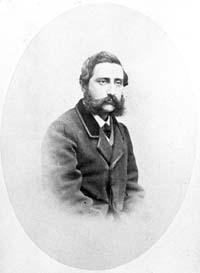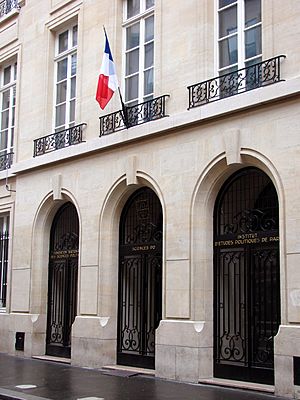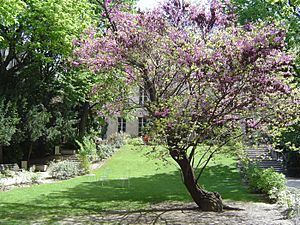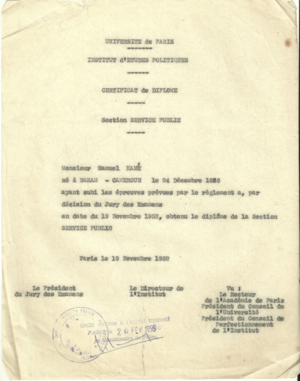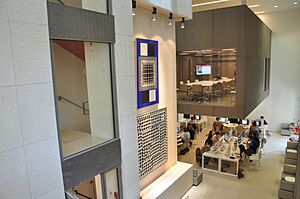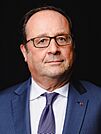Sciences Po facts for kids
|
Institut d'études politiques de Paris (French)
|
|
| Latin: Institutum Scientiarum Politicarum Parisiense | |
|
Other name
|
Sciences Po |
|---|---|
|
Former name
|
École libre des sciences politiques |
| Motto |
French: Aux racines de l'avenir
|
|
Motto in English
|
At the roots of the future |
| Type | Public research university Grande école Grand établissement Institut d'études politiques |
| Established | 1872 |
| Founder | Émile Boutmy |
| Endowment | €127.2 million (2018) |
| Budget | €197 million (2018) |
| Chairperson | Laurence Bertrand Dorléac (FNSP) |
| President | Luis Vassy |
| Provost | Sergei Guriev |
|
Academic staff
|
300 |
| Students | 15,000 |
| Undergraduates | 4,000 |
| Postgraduates | 10,000 |
| 350 | |
| Location |
,
France
48°51′15″N 2°19′43″E / 48.85417°N 2.32861°E |
| Campus | Urban |
| Language | French and English (official, university-wide) German (working language at the Nancy campus) Spanish (working language at the Poitiers campus) |
| Printing house | Sciences Po Press |
| Colours | Red White |
| Affiliations | CIVICA Sorbonne Paris Cité APSIA COUPERIN CGE |
| Mascot | The lion and the fox |
Sciences Po (French: [sjɑ̃s po]), also known as the Paris Institute of Political Studies, is a famous public university in Paris, France. It's known for teaching about politics and social sciences. Sciences Po is considered a "grande école," which means it's a top French higher education institution.
The university started in 1872. It was founded by Émile Boutmy after the Franco-Prussian War. The goal was to train new French leaders who understood politics, law, and history. Sciences Po was one of the first schools to focus on political science in France.
After World War II, the school became a public institution. Today, many Sciences Po graduates work in the private sector. Sciences Po Paris is special because it's the only one of its kind allowed to use the name "Sciences Po" without adding the city name. Other similar schools must say "Sciences Po Lille" or "Sciences Po Grenoble."
Sciences Po is also part of international groups like the Association of Professional Schools of International Affairs.
Contents
History of Sciences Po
Starting as a Free School (1872-1945)
Sciences Po began in December 1871 as the École libre des sciences politiques (ELSP). It was started by a group of French thinkers, politicians, and business people, led by Émile Boutmy. They created the school because they worried that France's leaders weren't well-educated enough. This was especially true after France lost the 1870 Franco-Prussian War.
The founders wanted to improve how French political and economic leaders were trained. They introduced new subjects like contemporary history. Before this, leaders mostly studied ancient history.
The school became very important in French politics. From 1901 to 1935, most people who joined the top French government jobs had studied at Sciences Po.
Other countries later created similar schools. These included institutions in Italy, Belgium, Germany, the United Kingdom (like the London School of Economics), and the United States.
Sciences Po also played a role in training people for French overseas administrations. In 1886, it started a program to train students for jobs in these areas. Many professors and staff members were connected to the government of these territories.
Becoming a Public Institution (1945)
After World War II, Sciences Po went through big changes in 1945. When France was freed from Nazi occupation, some people accused the school of working with the wartime government. They even suggested closing it down.
However, many Sciences Po graduates had also been part of the French Resistance. To save the school, its leaders removed staff members who had cooperated with the wartime government. They also worked hard to show the school's value.
The French government decided to keep the school but change its structure. They created two separate parts: the Institut d'études politiques (IEP) and the Fondation Nationale des Sciences Politiques (FNSP). Both were given the job of advancing political science, economics, and sociology.
The FNSP is a private foundation that manages the IEP, owns its buildings, and sets its budget. The IEP handles teaching, research, and library services. This setup gives Sciences Po a special status. It gets money from the government but also has a lot of freedom compared to other French universities. The name Sciences Po refers to both parts.
In 1945, the government also created the École Nationale d'Administration (ENA). This was a top school for training government officials. Sciences Po became the main place for students who wanted to get into ENA. This helped Sciences Po keep its important role in educating future high-ranking officials.
Growth and Modernization (1945-2012)
From 1947 to 1979, Jacques Chapsal led Sciences Po. During his time, the school grew geographically. It bought more buildings around its main campus in Paris. In 1976, Sciences Po started its own publishing company, Presses de Sciences Po.
In 1956, Sciences Po began offering its first PhD programs. A research center for political studies, CEVIPOF, was created in 1960.
Later, under the leadership of Richard Descoings (1997-2012), Sciences Po added more social science courses. These included law, economics, history, and sociology, in addition to political science. The school also started requiring all undergraduate students to study abroad for a year. It also introduced courses in many languages. Sciences Po also opened new campuses outside Paris.
During this time, Sciences Po also changed how it admitted students. Before, students were chosen only through a tough exam. In 2001, Sciences Po started the Equal Opportunity Program. This program helps talented students from less privileged backgrounds attend the school. As a result, more students received scholarships.
Recent Leadership and Events (2013-Present)
After Richard Descoings passed away, Frédéric Mion became the director in 2013. He focused on making Sciences Po a top international university. He created new graduate schools, like the School of Public Affairs and the Urban School.
In 2016, Sciences Po bought a new large building in Paris, the Hôtel de l'Artillerie. This expanded its campus. The new facility opened in 2022 and hosts several graduate schools and research centers.
In 2021, there were some issues at Sciences Po. Olivier Duhamel, a leader at the FNSP, resigned due to accusations. Frédéric Mion and other board members also resigned.
On November 22, 2021, Mathias Vicherat became the new director. He resigned on March 13, 2024. On March 26, Jean Bassères became the interim director. As of August 2025, Luis Vassy is the current president.
In April 2024, Sciences Po became a center for student protests in France related to the Gaza war.
Sciences Po Campuses
Sciences Po has seven campuses across France. Each campus focuses on a different region of the world. Every May, students from all seven campuses gather for a tournament called the Collégiades de Sciences Po. They compete in arts and sports.
Paris Campus
The main campus is in Paris. It has several buildings near the Boulevard Saint-Germain. The historic main building at 27 rue Saint-Guillaume has classrooms and the central library. It is in an old mansion called Hôtel de Mortemart.
Other buildings in Paris include:
- 117, boulevard Saint-Germain: Home to the Sciences Po Journalism School.
- 199, boulevard Saint-Germain: For the Doctoral School.
- 13, rue de l'Université: Houses the Sciences Po Law School and administrative offices.
- 28, rue des Saints-Pères: Home to the Paris School of International Affairs (PSIA).
About 3,000 undergraduate students study at the Paris campus. Many of them are international exchange students.
Dijon Campus
The Dijon campus opened in 2001. It is in a 19th-century building in the Burgundy region. This campus focuses on the European Union, especially Central and Eastern Europe. Courses are taught in French. Students can learn languages like Hungarian, Polish, and Russian.
Le Havre Campus
The Le Havre campus is on the coast of Normandy. Since 2007, it has offered an undergraduate program focused on Europe and Asia, taught in English. Students can learn Chinese, Japanese, and Korean. Many students choose to spend their third year studying in an Asian country.
Menton Campus
The Menton campus opened in 2005 in the French Riviera city of Menton. It is in a renovated 19th-century building with views of the Mediterranean Sea. This campus specializes in the Middle East and the Mediterranean region. It welcomes about 300 students each year. Programs are taught in French or English. Students can learn Arabic, Turkish, Italian, and Spanish.
Nancy Campus
The Nancy campus, established in 2000, is in the Lorraine region. It is located in an 18th-century building. The curriculum focuses on the European Union and French-German relations. Courses are taught in French, English, and German.
Poitiers Campus
Opened in 2010, the Poitiers campus is in the historic city of Poitiers. It is in a renovated 15th-century building. This campus focuses on Latin America and the Iberian Peninsula. The program is mainly in French, with some courses in English and Spanish. Students can learn Spanish and Portuguese.
Reims Campus
The Reims campus opened in September 2010. It is in a 17th-century building. It is the largest regional campus, with over 1,600 undergraduate students. More than half of its students are international. This campus offers two specializations: North America (taught in English) and Africa (taught in French).
How Sciences Po Works
Governance and Management
Sciences Po has a unique way of being managed. It has two main parts: the Fondation nationale des sciences politiques (FNSP), which is a private non-profit foundation, and the Institut d’études politiques de Paris (IEP), which is a public higher education institution. Together, these two parts are known as Sciences Po.
The FNSP is in charge of the big picture plans, as well as the money and administration of Sciences Po. The IEP focuses on teaching, research, and library services, like other universities.
The school's leaders work together to make decisions and manage the institution every day.
Finances
Sciences Po's own money has grown a lot over the years. This money comes from various sources, including donations. The school has also taken on some debt to pay for new buildings and renovations, like the new Paris campus.
Education at Sciences Po
Sciences Po offers different levels of study: an Undergraduate College, several professional graduate schools, and a Doctoral School for PhD students.
Undergraduate Studies
The Undergraduate College offers a three-year Bachelor of Arts degree. Students learn about many subjects in the humanities and social sciences. These include economics, history, law, political science, and sociology. They also get training in civic engagement, languages, arts, and digital skills.
In the first year, students take basic courses in these subjects. In the second year, they choose a main area of study, like Politics & Government or Economics & Societies. The third year is spent studying abroad at a partner university. Each campus also has a special focus on a different world region, such as Africa, Asia, or North America.
Sciences Po also has special dual bachelor's degree programs with universities around the world. These include Columbia University, University College London, and the National University of Singapore.
In 2021, about 15,000 students applied to the Undergraduate College. About 1,600 students were accepted, which means the acceptance rate was around 7%.
Graduate Studies
At the graduate level, Sciences Po has seven schools. They offer one- or two-year Master's programs and PhD programs. All graduate programs are in Paris. Sciences Po also has dual Master's programs with international universities. Students in these programs spend one year at Sciences Po and one year at the partner university.
Sciences Po Schools
The Undergraduate College is for all bachelor's degree students. For graduate students, there are seven professional schools:
- Sciences Po School of Public Affairs
- Paris School of International Affairs
- Sciences Po Law School
- Sciences Po Urban School
- Sciences Po School of Management and Impact
- Sciences Po Journalism School
- Paris Climate School
- Sciences Po School of Research
The School of Research offers Master's and PhD programs in subjects like law, economics, history, political science, and sociology. It has about 600 PhD students.
Research at Sciences Po
Sciences Po is a place where a lot of research happens. Researchers study economics, law, history, sociology, and political science. They also look at topics like cities, climate change, and how societies change.
The institute has many research centers. Some of these are connected to France's National Centre for Scientific Research (CNRS). These centers study things like:
- How data from surveys is used.
- European studies and how governments work.
- International relations and global events.
- Political attitudes and ideas.
- History, including wars and societies.
- How organizations and public policies work.
- Social changes and inequalities.
- Economic issues like job markets.
- Law, including international law.
- How new technologies affect information.
- Economic forecasting and analysis.
Sciences Po also has special research programs that look at public policies and how people deal with economic changes.
Library and Publishing
The Bibliothèque de Sciences Po (Sciences Po Library) was founded in 1871. It has over 950,000 books and resources about social sciences. It is a very important library for political science in France.
Presses de Sciences Po is the school's publishing house. It publishes academic books about social sciences.
Public Lectures
Sciences Po often hosts public talks with important guests. Past speakers have included Ban Ki-moon (former UN Secretary-General), Condoleezza Rice (former US Secretary of State), and Angela Merkel (former German Chancellor).
Reputation and Rankings
National Recognition
Sciences Po is often called France's "leading university in the social sciences." It is seen as the most respected of all the IEPs (Institutes of Political Studies) in France. Many people consider it an elite school because it's hard to get into and has strong connections to important people in French society.
In 2022, about 10% of students who applied to the undergraduate program were accepted. In 2023, French students who joined the school had very high grades in their high school exams.
National rankings often place Sciences Po very high in subjects like sociology and social policy.
International Rankings
In global rankings, Sciences Po is highly regarded for political science. In 2023, it ranked 2nd worldwide for the study of Politics in the QS World University Subjects Rankings. It was also ranked 39th in social sciences by Times Higher Education.
| Year | 2014 | 2015 | 2016 | 2017 | 2018 | 2019 | 2020 | 2021 | 2022 | 2023 |
|---|---|---|---|---|---|---|---|---|---|---|
| Global and regional rankings | ||||||||||
| QS - Global ranking | 214 | 222 | 223 | 220 | 220 | 221 | 242 (7) | 242 (7) | 261 | 259 |
| THE - Global ranking | 401–500 | 401–500 | 401–500 (19) | 501-600 (21) | ||||||
| By field | ||||||||||
| QS - Social Sciences & Management | – | – | – | 62 | 67 | 69 | 59 (4) | 56 (3) | 65 (4) | |
| THE - Social Sciences & Management | 69 (2) | 39 (1) | ||||||||
| QS - Arts & Humanities | – | – | – | 154 | 207 | 176 | 170 (6) | 162 (5) | ||
| THE - Arts & Humanities | -/536 (-/20) | |||||||||
| By subject | ||||||||||
| QS - Politics | 13 | 5 | 4 | 4 | 4 | 3 | 2 | 2 (1) | 3 (1) | 3 |
| QS - Social Policy & Administration | – | – | 40 | 51–100 | 48 | 22 | 23 | 21 (1) | 13 | |
| QS - Sociology | 36 | 51–100 | 50 | 44 | 37 | 28 | 28 | 27 | ||
| QS - Development Studies | – | 51–100 | 51–100 | – | 51–100 | 51–100 | 40 | 51–100 | ||
| QS - Law & Legal Studies | 51–100 | 51–100 | 51–100 | 51–100 | 51–100 | 51–100 | 50 | 65 (2) | ||
| THE - Law | –/190 (–/2) | –/290 (–/6) | ||||||||
| Eduniversal - Law (global) | (–/15) | |||||||||
| QS - Economics & Econometrics | 101–150 | 101–150 | 51–100 | 101–150 | 101–150 | 101–150 | 51–100 | 89 (6) | ||
| THE - Business & Economics | –/632 (–/20) | |||||||||
| QS - History | – | – | 101–150 | 51–100 | 51–100 | 101–150 | 101–150 | |||
| QS - Philosophy | – | – | – | – | – | – | 151–200 | |||
| QS - Modern Languages | – | 151–200 | 201–250 | 251–300 | 201–250 | 201–250 | 201–250 | |||
| QS - Accounting & Finance | – | – | – | – | – | 201–250 | 201–250 | 251-300 (10) | ||
Reputation and Views
Sciences Po is known as a very important school in France. It has been called a "school of power" because it trains many of the country's leaders. Some people have criticized it for being too focused on a certain type of elite.
The school's main teaching style is to cover many different subjects. Students learn about political science, economics, history, law, and international relations. This broad approach is seen as both a strength and sometimes a weakness.
Notable People from Sciences Po
Alumni (Former Students)
Many famous people have studied at Sciences Po. In 2016, the Sciences Po Alumni Association said there were 55,000 former students.
Leaders in Politics
Six of the eight presidents of the French Fifth Republic studied at Sciences Po. These include Georges Pompidou, François Mitterrand, Jacques Chirac, Nicolas Sarkozy, François Hollande, and Emmanuel Macron.
In 2017, about 14% of French members of parliament were Sciences Po graduates. This made it the most represented higher education institution in the National Assembly.
Many Sciences Po alumni have also held important roles in international organizations. For example, Simone Veil was a former President of the European Parliament. Boutros Boutros-Ghali was a former UN Secretary General.
Leaders from other countries have also studied at Sciences Po. These include Władysław Grabski (former Prime Minister of Poland) and Salome Zourabichvili (current President of Georgia).
Sciences Po has also given honorary doctorates to important figures like Václav Havel and Angela Merkel.
Diplomats
Many senior French diplomats are also alumni of Sciences Po. These include François Delattre (Permanent Representative of France to the UN) and Gérard Araud (former ambassador to the USA).
Other Notable Alumni
Other famous alumni include the writer Marcel Proust, the founder of the modern Olympics Pierre de Coubertin, and fashion designer Christian Dior. Authors like Leïla Slimani and Emmanuel Carrère also studied there.
Notable Staff (Teachers and Researchers)
Many important people have taught at Sciences Po. Louis Renault, who won the Nobel Peace Prize in 1907, taught international law there.
Famous economists like Jean-Paul Fitoussi and Michel Aglietta have taught economics at Sciences Po. The well-known philosopher and sociologist Bruno Latour taught there until 2022.
Historians like Pierre Renouvin and Jean-Baptiste Duroselle were also professors.
Several French presidents have taught at Sciences Po before becoming leaders. These include Raymond Poincaré, Georges Pompidou, Jacques Chirac, François Hollande, and Emmanuel Macron.
Leaders of Sciences Po
National Foundation of Sciences Po (FNSP)
- 1945–1959 : André Siegfried
- 1959–1971 : Pierre Renouvin
- 1971–1981 : François Goguel
- 1981–2007 : René Rémond
- 2007–2016 : Jean-Claude Casanova
- 2016–2021 : Olivier Duhamel
- 2021–present : Laurence Bertrand Dorléac
Sciences Po Directors
- 1872–1906 : Émile Boutmy
- 1906–1936 : Eugène d'Eichthal
- 1945–1947 : Roger Seydoux
- 1947–1979 : Jacques Chapsal
- 1979–1987 : Michel Gentot
- 1987–1996: Alain Lancelot
- 1997–2012: Richard Descoings
- 2013–2021: Frédéric Mion
- 2021–2024: Mathias Vicherat
- 2024: Jean Bassères (interim)
- 2024–present: Luis Vassy
See also
 In Spanish: Instituto de Estudios Políticos de París para niños
In Spanish: Instituto de Estudios Políticos de París para niños
- Association of Professional Schools of International Affairs
- École nationale d'administration
- Grandes écoles
- Grands établissements
- Instituts d'études politiques
- List of Sciences Po honorary doctorate laureates
- Paris School of International Affairs
 | Bayard Rustin |
 | Jeannette Carter |
 | Jeremiah A. Brown |


